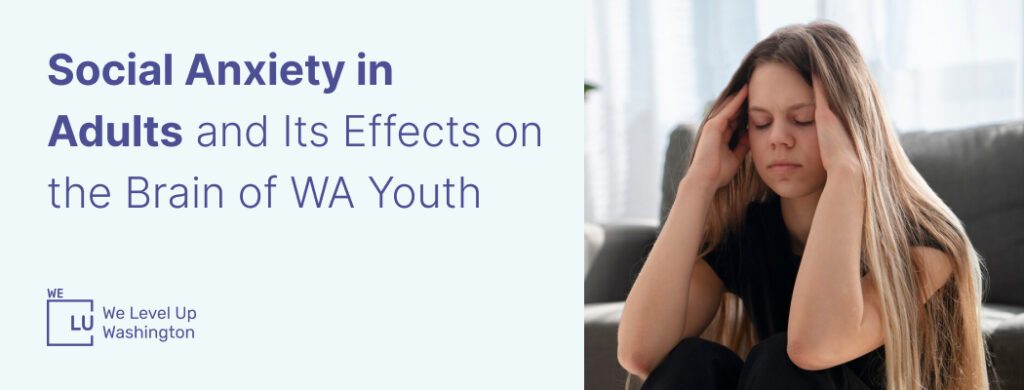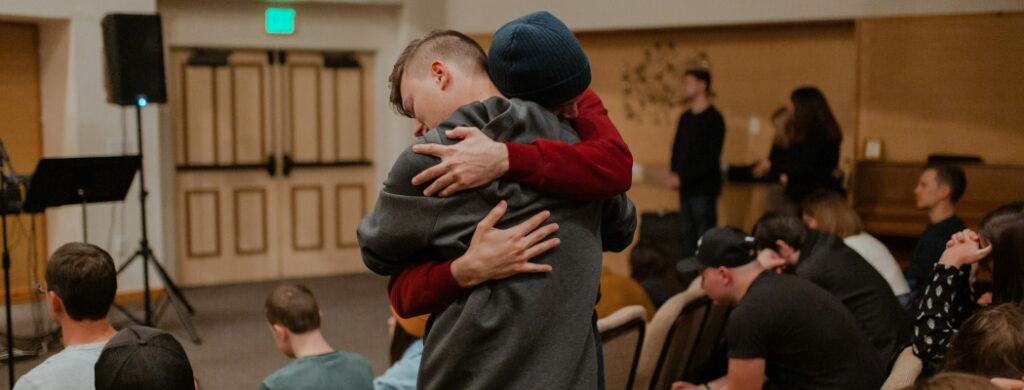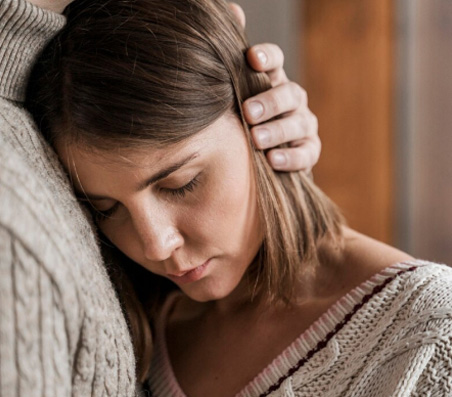The conversation on mental health has mainly focused on the rising worries about different types of anxiety, depression, and related disorders in recent decades. This is a nice shift, given that these issues used to be only whispered about in the corridors of healthcare and social welfare.
Social anxiety in adults is one of the greatest concerns among these issues since it affects people everywhere. It’s a problem that doesn’t recognize geographical boundaries. This condition impacts the lives of people from the most remote areas to the lively cities and peaceful towns across Washington State.
However, social anxiety among Washington youth is not an isolated phenomenon but one that mirrors a global trend. It highlights the universal challenge of mental health in our modern society. Getting to grips with this problem is crucial if we want to help young adults in Washington (and around the world) win these quiet battles they are fighting.
Skip to:
What is social anxiety in adults?
An overwhelming fear of social situations and worries about appearing foolish or embarrassed characterize social anxiety in adults. This anxiety can significantly impair daily functioning and social interactions. Factors contributing to social anxiety include genetics, environmental influences, and personal experiences.
The connection between social anxiety and ADHD in adults also exists. So, it’s not a surprise that many wonder, “Is anxiety a disability?” Although anxiety isn’t always recognized as a disability, severe cases of social anxiety can indeed qualify you for disability benefits. This is because it can significantly hinder your ability to engage in major life activities.

Sadly, social anxiety disorder frequently remains unnoticed or untreated. This issue isn’t limited to just Washington State but is a common scenario worldwide. That is because people don’t really understand this condition, which can make it even worse for those who suffer from it.
It can lead to a decline in academic performance and difficulties in social interactions. It also carries an increased risk of substance use disorders. Therefore, recognizing the magnitude of social anxiety among Washington’s youth is just the beginning. We have to understand the very nature of this disorder and its effects. That is the only way to deal with it well.
Prevalence of social anxiety in Washington State adults and youth
It’s incredible how much social anxiety disorder (SAD) is affecting young people in the United States. According to the National Institute of Mental Health, around 7.1% of adults in the U.S. have dealt with social anxiety disorder in the past year. It’s even more common among females than males.
But it doesn’t stop there. About 9.1% of teenagers aged 13–18 are dealing with this too. It’s like a silent struggle happening all around us, and it’s affecting our youth in ways we might not even realize.
Shifting our attention to Washington State, it’s striking how closely our situation mirrors the national picture. Mental Health America’s 2023 data reveals that approximately 14% of young individuals in Washington are grappling with social anxiety. That’s higher than the national average of 11.5%, making our state one of the most affected in the country.
This statistic is more than just a number; it’s a wake-up call. The situation is urgent, and the need for effective solutions and support systems to tackle social anxiety among young adults here in Washington is pressing.
Get Help. Get Better. Get Your Life Back.
Searching for Accredited Dual Diagnosis Mental Health Centers Near You?
Even if therapy failed previously, or are in the middle of a difficult crisis, we stand ready to support you. Our trusted behavioral health specialists will not give up on you. When you feel ready or just want someone to speak to about counseling alternatives to change your life call us. Even if we cannot assist you, we will lead you to wherever you can get support. There is no obligation. Call our hotline today.
FREE 24/7 Dual Diagnosis Mental Health Services HotlineThe impact of social anxiety disorder on the brain
Beyond mere shyness, social anxiety manifests as a profound neurological and psychological challenge. It affects the neurological pathways in the developing brains of young people. It even alters the brain’s structure and function. Understanding these neurological changes is crucial for comprehensive treatment approaches.
Social anxiety affects a number of key brain regions, including:
- The Amygdala. This region, central to processing fear and emotional responses, becomes hyperactive in social anxiety. This heightened activity leads to an exaggerated fear response in social situations.
- Medial Prefrontal Cortex (MPFC). Involved in self-processing and understanding others, the MPFC shows varied activation patterns in social anxiety, affecting how threats are perceived and social cues are processed.
- The Insula. Essential for emotional and sensory processing, this area becomes overactive, intensifying the perception of threats and fear responses.
- Anterior Cingulate Cortex (ACC). This region, which monitors outcomes and social interactions, shows hyperactivity in parts that contribute to the magnification of threat responses and anxiety in social scenarios.
- The Hippocampus. Integral to memory and emotional regulation, its interaction with the amygdala and prefrontal cortex influences how fear and anxiety are experienced and recalled, impacting reactions in social situations.
Signs of social anxiety disorder in adults
People who suffer from social anxiety disorder (SAD) have several emotional, cognitive, and physical symptoms that can be quite challenging. Extreme anxiety and discomfort when they are in social situations may become overwhelming. What is more, the ongoing concern that others will judge them poorly or shame them makes everything even worse.

This condition frequently causes social situation avoidance, which has a major negative impact on day-to-day functioning and quality of life. Here are the most common social anxiety disorder symptoms in adults:
- Cognitive symptoms include constant fears of judgment, intense worry about future social interactions, and a deep sense of inadequacy. These symptoms can be so overwhelming that some may seek a high functioning anxiety test to understand their experiences better, even though they can manage their daily responsibilities effectively.
- Physical signs of social anxiety disorder in adults often manifest as blushing, sweating, trembling, or experiencing a rapid heartbeat in social situations. These involuntary responses intensify the dread of shame and social scrutiny. That is how a vicious cycle of avoidance and anxiety appears.
What causes social anxiety in adults?
Social anxiety in young adults can arise from various causes. They can be:
- Past social experiences
- Family history
- Biological factors
We need to understand why adult social anxiety develops if we want to create successful treatment plans. Due to the complexity of the condition, therapy must be multimodal and include cognitive-behavioral methods, medication, and support networks to assist patients in working through these obstacles.
Identifying the signs of social anxiety in adults is crucial for getting the support necessary. Getting help early on can ease the effects of the disorder. This will make it more possible to regain confidence in social settings and improve overall well-being. Fortunately, there are many amazing anxiety treatment centers in Washington state that are ready to assist young adults in achieving this, with We Level Up Washington at the forefront!
End the Emotional Pain. Get Your Life Back.
Feeling Depressed, Anxious or Struggling with Mental Health Illness? Get Safe Comfortable Mental Health Dual Diagnosis High-Quality Therapy From Counselors That Care. Begin Your Recovery Now.
Hotline: (509) 348-4077

Social anxiety and ADHD in adults
The connection between social anxiety and ADHD is undeniable. It is like a tangled web of thoughts and emotions that makes attention and social interactions difficult. A person with ADHD may struggle to stay focused or control impulses. It can make social situations feel like a maze they’re constantly trying to navigate. The frustration can be overwhelming, and it can cause feelings of anxiety because this person will constantly worry they’ll say or do the wrong thing.
Of course, in their mind, doing or saying something wrong leads to embarrassment and rejection. And so, the vicious cycle is born. Imagine feeling like everyone else has the rulebook for socializing, but you can’t seem to figure it out, no matter how hard you try. This constant struggle can chip away at confidence. It is only natural to start avoiding social interactions altogether.
But here’s the thing: Once you understand the connection between social anxiety and ADHD in adults, it is like finding a flashlight in the dark. It helps shine a light on why social situations feel so scary and offers hope for finding ways to handle them better.
Treatment options for social anxiety in WA youth
The striking statistics surrounding social anxiety in adults have served as a wake-up call. Effective anxiety treatment strategies are urgent. Fortunately, there is a silver lining: a wide array of treatment options are now available. Also, treatment isn’t just about popping pills or sitting on a therapist’s couch. It’s about finding tools and strategies to help you manage your struggles long-term.
Therapeutic approaches for social anxiety in adults
Cognitive behavioral therapy (CBT) is a highly effective treatment for managing social anxiety, particularly in youth. CBT works by altering brain responses and behavior patterns associated with anxiety. By addressing negative thought patterns and behaviors, CBT helps develop coping strategies and resilience against anxiety triggers.
For youth in Washington, access to CBT and related therapies is essential. Luckily, it’s also simple and easy. Here at We Level UP Washington, we offer specialized CBT for anxiety disorders and provide a supportive environment where young people can learn to manage their issue effectively.
First-class Facilities & Amenities
World-class High-Quality Addiction & Mental Health Rehabilitation Treatment
Rehab Centers TourRenowned Addiction Centers. Serene Private Facilities. Inpatient rehab programs vary.
Mental Health Helpline: (509) 348-4077Proven recovery success experience, backed by a Team w/ History of:
15+
Years of Unified Experience
100s
5-Star Reviews Across Our Centers
10K
Recovery Success Stories Across Our Network
- Low Patient to Therapist Ratio
- Comprehensive Dual-Diagnosis Treatment
- Complimentary Family & Alumni Programs
- Coaching, Recovery & Development Events
- Comfortable Onsite Medical Detox Center
Medicinal interventions for social anxiety in young adults
To manage social anxiety in young people, doctors commonly use Selective Serotonin Reuptake Inhibitors (SSRIs) as the initial pharmacological treatment. These medications include escitalopram (Lexapro), sertraline (Zoloft), and fluoxetine (Prozac). They work by blocking the reabsorption of serotonin, a crucial neurotransmitter involved in regulating mood, which helps to control anxiety levels.
People often wonder, “Does Wellbutrin help with anxiety?” Wellbutrin is a drug commonly prescribed for depression and also helps with anxiety. However, while it can improve anxiety symptoms for some, it’s not typically used for social anxiety. Its effectiveness for anxiety linked to depression doesn’t necessarily translate to general anxiety disorders.
For immediate relief from severe anxiety symptoms, doctors might prescribe benzodiazepines, such as alprazolam (Xanax) and clonazepam (Klonopin). However, because of the potential for addiction, these medicines are not recommended for long-term treatment. Typically, medication is one component of a wider treatment plan that also includes therapy. That is how we can provide a holistic approach to managing social anxiety in adults.
Support systems
Support systems are crucial for people grappling with social anxiety. Sharing experiences with those around oneself can shed light on what causes social anxiety in adults, offer insights, and foster a deeper understanding of the condition. Such systems include family, friends, and group therapy, where you can openly discuss struggles and victories, creating a nurturing environment of empathy and connection.
This exchange of personal stories and coping strategies enriches the support experience. It truly enables members to learn from each other and feel less isolated in their journey. It emphasizes how crucial community is to the healing process since it fosters a sense of acceptance and understanding among people. This can greatly lessen the load of social anxiety. Through these exchanges, you learn fresh approaches to anxiety management, highlighting the importance of encouraging connections in overcoming the challenges associated with social anxiety.

Addressing social anxiety as an adult
We Level Up Washington recognizes how crucial seeking treatment for any type of mental health issue is, social anxiety included. We also strive to complement the treatment of this disorder with our dedicated services meant to alleviate social anxiety in adults and all the effects it may have on the brains of young, still-developing minds. Social anxiety can be crippling, but it also doesn’t have to be! Together, we can create a supportive environment that empowers youth to overcome it and pave the way for a healthier, more confident future.
Sources:
- Higuera, Valencia. “Social Anxiety Disorder.” Healthline, Healthline Media, 2 July 2012, www.healthline.com/health/anxiety/social-phobia.
- Jefferies, Philip, and Michael Ungar. “Social Anxiety in Young People: A Prevalence Study in Seven Countries.” PLOS ONE, vol. 15, no. 9, 17 Sept. 2020, journals.plos.org/plosone/article?id=10.1371/journal.pone.0239133, https://doi.org/10.1371/journal.pone.0239133.
- Leigh, Eleanor, and David M. Clark. “Understanding Social Anxiety Disorder in Adolescents and Improving Treatment Outcomes: Applying the Cognitive Model of Clark and Wells (1995).” Clinical Child and Family Psychology Review, vol. 21, no. 3, 13 Apr. 2018, pp. 388–414, www.ncbi.nlm.nih.gov/pmc/articles/PMC6447508/, https://doi.org/10.1007/s10567-018-0258-5.
- National Institute of Mental Health. “NIMH: Social Anxiety Disorder.” Www.nimh.nih.gov, 2017, www.nimh.nih.gov/health/statistics/social-anxiety-disorder.
- “Social Anxiety Disorder: More than Just Shyness.” National Institute of Mental Health, 2022, www.nimh.nih.gov/health/publications/social-anxiety-disorder-more-than-just-shyness.
- Smith, A.R., et al. “Social Anxiety and Age Are Associated with Neural Response to Social Evaluation during Adolescence.” Developmental Cognitive Neuroscience, vol. 42, Apr. 2020, p. 100768, https://doi.org/10.1016/j.dcn.2020.100768.
World-class, Accredited, 5-Star Reviewed, Effective Mental Health Dual Diagnosis Programs. Complete Integrated Inpatient Rehab with Free Post Discharge Therapy Planning.
Hotline: (509) 348-4077End the Emotional Pain Rollercoaster. Gain Stability & Happiness Through Recovery Treatment. Start Mental Health Counseling Today. Get Free No-obligation Guidance by Behaviroal Health Specialists Who Understand Mental Health Recovery.
Experience Transformative Recovery at the We Level Up Treatment Center.
See our authentic success stories. Get inspired.
Get the help you deserve.



Start a New Life
Begin with a free call to a behavioral health treatment advisor. Learn more about our dual-diagnosis programs. The We Level Up treatment center network delivers recovery programs that vary by each treatment facility. Call to learn more.
- Personalized Care
- Caring Accountable Staff
- World-class Amenities
- Licensed & Accredited
- Renowned w/ 5-Star Reviews





